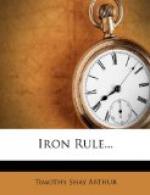“I couldn’t help it, mother,” replied Andrew.
“Oh, yes, you could.”
“Indeed I couldn’t, mother. I saw Emily, and then I couldn’t help it.”
There was an expression in the child’s voice as he said this, that thrilled the feelings of his mother. She felt that he spoke only the simple truth—that he could not help doing as he had done.
“But Andrew must help it,” she was constrained to reply. “Mother can’t let him go to the front door again.”
“You won’t tell father, will you?” urged the child, lifting, earnestly, his large, bright, innocent eyes to his mother’s face. “Say, you won’t tell him?”
Grieved, perplexed, and troubled, Mrs. Howland knew not what to say, nor how to act.
“Dear mother!” urged the boy, “you won’t tell father? Say you won’t?” And tears began to glisten beneath his eyelids.
“Andrew has been disobedient,” said the mother, trying to assume an offended tone. “Will he be so anymore?”
“If you won’t tell father, I’ll be good.”
The mother sighed, and fixed her gaze musingly on the floor. Her thoughts were still more confused, and her mind in still greater perplexity. Ah, if she only knew what was right!
“I will not tell your father this time,” she at length said, “but don’t ask me, if you are again disobedient.”
But of what avail was the child’s promises. He had strong feelings, a strong will, and, though so very young, much endurance. A law, at variance almost with a law of his nature, had been arbitrarily enacted, and he could not obey it. As well might his father have shut him up, hungry, in a room filled with tempting food, and commanded him not to touch or taste it. Had an allegation of evil conduct been brought against Emily Winters; had any right reason for the interdiction been given, then Mr. Howland might have had some power over the strong will and stronger inclinations of the child. But into the mind of Andrew, young as he was, came a sense of injustice and wrong on the part of his father, and there was no willingness, from filial duty, to yield obedience in a case where every feeling of his heart was at variance with the command.
The struggle so early commenced between the father and his child, was an unceasing one. The will of Andrew, which by other treatment might have been bent to obedience, gained a vigor like the young oak amid storms, in the strife and reaction of his daily life. Instead of drawing his child to him, there was ever about Mr. Howland a sphere of repulsion. Andrew was always doing something to offend his father; and his father was in consequence always offended. A kind word from paternal lips rarely touched the ears of the boy, and, but for the love of his gentle mother, home would have been almost intolerable. Steadily, against all opposition, chidings, and punishment, Andrew would seek the company of his little friend Emily on every convenient occasion. To avoid




